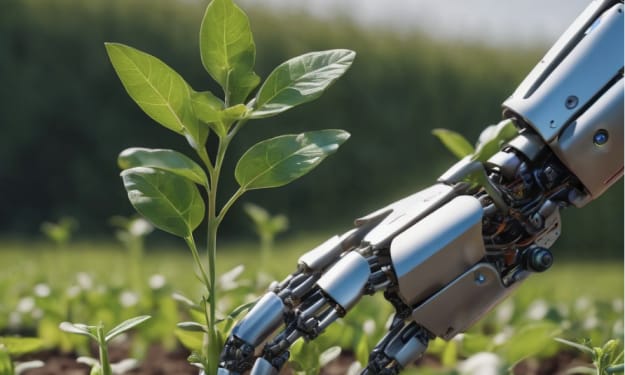
Frank had been a farmer at Helm farm since he was 16. He was 62 now and showed no signs of slowing down. Not that he could have even if we wanted to. He often joked that the farm was his wife, and he needed to stand by her in sickness and in health, because nobody else was going to do it. He had never married, or had children, and his few nieces and nephews quickly left the nearby city of Plymouth for more exciting larger cities. None of them had ever intended to become farmers themselves, the work was too relentless and financially unforgiving. Frank was acutely aware that once he was no longer able, the farm would likely become abandoned and become another part of windswept Dartmoor wilderness.
It was with extreme reluctance that he had taken advantage of the government scheme providing a robot worker to assist him. This was partly pride, but mostly because he had always had an intense distrust of the government. His grandfather had often told him about the shooting of George Raymond Walden and how non farmers - but politicians in particular - were all had poor hearing and big egos, and as such were dangerous. George had been ordered by the Hampshire War Agricultural Executive Committee to plow up parts of his farm to aid the war effort. The problem was that these fields were used as pasturage for his horses and cattle, and it would have meant that they would all need to be destroyed. George had refused, and under the new powers the government had granted themselves, this meant that he could be forcefully evicted from his own farm. A farm that he owned and had been in his family for generations. He would not even be allowed to remain in his home, as the policy was never to leave the farmer in his home when his land had been taken over. When the policemen arrived to remove him, George open fire and barricaded himself in the house. After an all-night siege George was shot by one of the policemen in the head and died in hospital a few days later. Franks grandfather would often point out how it had been the policy of the government to cull all “non useful’ animals too. Millions of sheep, horses and even dogs and cats had been killed to avoid using up recourses.
“They should have thanked their lucky stars that the war ended when it did, they killed all the animals that made the fertilisers!” He had said.
Anxious about over involvement with government, Frank waited several years before he finally accepted the robot. When he finally did he observed it with apprehension, but begrudging acceptance that the robot was indeed very useful. It could easy carry a hay bale under each arm, operate the tractor and obey commands perfectly - provided no euphemisms, common expressions or allegories were used. Being told to work “until the cows came home” had mixed results.
After a year or two Frank would often be seen working his farm side by side with his robot, which he had named i. When asked why, he would say that it was the best iPhone he’d every owned.
About the Creator
Enjoyed the story? Support the Creator.
Subscribe for free to receive all their stories in your feed. You could also pledge your support or give them a one-off tip, letting them know you appreciate their work.






Comments (1)
"Frank's story is a reminder that even in the face of change, there's always something to learn and appreciate about the past."